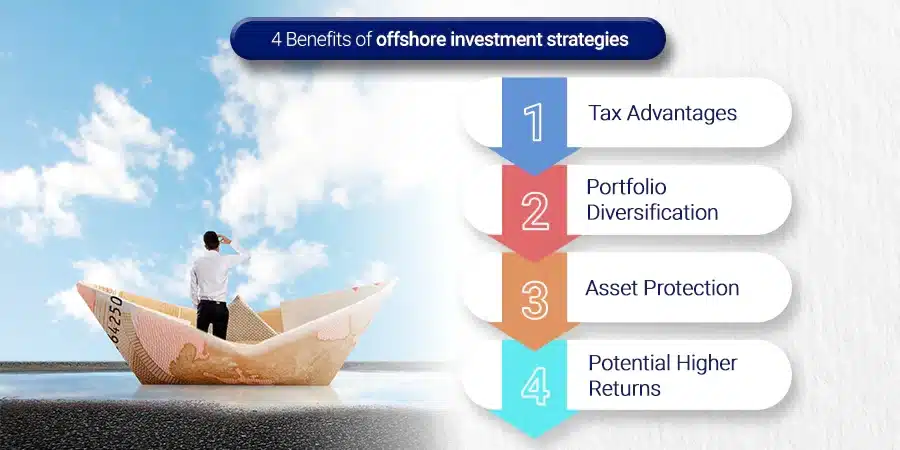What You Need to Think About Prior To Making an Offshore Investment Choice
What You Need to Think About Prior To Making an Offshore Investment Choice
Blog Article
Just How Offshore Investment Works: A Step-by-Step Failure for Investors
Offshore investment provides an organized path for capitalists looking for to optimize their financial methods while leveraging international possibilities - Offshore Investment. The procedure starts with the careful selection of a jurisdiction that lines up with a financier's objectives, adhered to by the facility of an account with a legitimate overseas establishment. This systematic strategy not just enables profile diversity yet additionally demands recurring monitoring to browse the intricacies of global markets. As we discover each action in information, it comes to be noticeable that recognizing the subtleties of this financial investment approach is crucial for attaining optimum end results.

Recognizing Offshore Financial Investment
Understanding overseas investment entails acknowledging the critical advantages it supplies to individuals and firms looking for to optimize their monetary profiles. Offshore investments commonly refer to possessions kept in a foreign territory, typically identified by beneficial tax obligation regimes, regulative settings, and privacy securities. The key objective behind such financial investments is to enhance funding diversity, growth, and risk management.

Investors can access a large variety of economic tools via offshore venues, including stocks, bonds, mutual funds, and property. These investments are commonly structured to adhere to neighborhood regulations while supplying flexibility in terms of asset allocation. Additionally, offshore investment strategies can enable companies and individuals to hedge against domestic market volatility and geopolitical risks.
An additional trick facet of overseas investment is the capacity for enhanced privacy. A comprehensive understanding of both the obligations and benefits linked with offshore financial investments is essential for notified decision-making.
Benefits of Offshore Investing
Investors commonly transform to offshore spending for its numerous advantages, consisting of tax efficiency, property protection, and portfolio diversity. Among the primary benefits is the capacity for tax obligation optimization. Many overseas territories offer positive tax obligation regimes, allowing financiers to legitimately lower their tax liabilities and make the most of returns on their financial investments.
In addition, overseas accounts can provide a layer of asset security. Offshore Investment. By putting possessions in politically secure territories with solid privacy laws, financiers can protect their riches from possible lawful cases, financial institutions, or financial instability in their home nations. This form of protection is especially attracting high-net-worth individuals and entrepreneurs dealing with litigation risks
Additionally, offshore investing facilitates portfolio diversification. Accessing global markets allows investors to discover possibilities in numerous property classes, including real estate, stocks, and bonds, which might not be offered domestically. This diversification can reduce overall profile danger and improve prospective returns.
Ultimately, the advantages of overseas investing are compelling for those looking for to enhance their financial approaches. Nevertheless, it is crucial for investors to extensively comprehend the effects and guidelines connected with overseas investments to ensure compliance and attain their financial goals.
Selecting the Right Territory
Choosing the suitable territory for offshore investing is a critical decision that can dramatically influence an investor's economic strategy. The best territory can provide different benefits, consisting of beneficial tax obligation frameworks, asset security regulations, and regulatory atmospheres that line up with a capitalist's goals.
When selecting a jurisdiction, Offshore Investment take into consideration factors such as the political stability and financial health of the country, as these aspects can impact financial investment safety and security and returns. Moreover, the lawful structure bordering international investments must be reviewed to make certain conformity and protection of assets. Countries understood for robust legal systems and transparency, like Singapore or Switzerland, typically impart higher self-confidence amongst financiers.
Furthermore, evaluate the tax implications of the jurisdiction. Some nations supply eye-catching tax motivations, while others might impose strict reporting requirements. Comprehending these nuances can assist in optimizing tax liabilities.

Actions to Establish an Offshore Account
Establishing an overseas account entails a series of systematic steps that ensure compliance and safety and security. The initial step is picking a respectable offshore banks, which need to be licensed and controlled in its territory. Conduct comprehensive study to analyze the organization's reputation, services used, and consumer reviews.
Next, gather the needed documents, which generally consists of recognition, proof of address, and details regarding the source of funds. Different jurisdictions may have differing needs, so it is crucial to confirm what is needed.
When the documentation is prepared, initiate the application process. This may include filling up out types on-line or personally, relying on the establishment's methods. Be prepared for a due diligence process where the bank will confirm your identity and examine any kind of possible threats connected with your account.
After authorization, you will certainly receive your account details, allowing you to money your overseas account. It is suggested to keep clear documents of all deals and abide by tax policies in your home country. Establishing the account correctly sets the structure for reliable overseas investment management in the future.
Managing and Checking Your Investments
When an offshore account is successfully set up, the focus moves to managing and monitoring your investments efficiently. This crucial phase entails an organized technique to guarantee your properties line up with your financial objectives and run the risk of tolerance.
Begin by developing a clear financial investment technique that details your goals, whether they are capital preservation, income generation, or development. On a regular basis evaluate your view it portfolio's efficiency against these standards to evaluate whether changes are required. Utilizing monetary management devices and platforms can promote real-time tracking of your financial investments, supplying insights into market fads and possession allocation.
Involving with your overseas financial expert is important. They can supply know-how and assistance, aiding you navigate complicated regulatory settings and global markets. Schedule regular testimonials to talk about efficiency, analyze market conditions, and rectify your strategy as needed.
In addition, remain educated about geopolitical advancements and financial indicators that may affect your financial investments. This proactive method allows you to react promptly to changing conditions, guaranteeing your overseas portfolio stays durable and straightened with your financial investment goals. Eventually, thorough monitoring and ongoing monitoring are essential for making the most of the visit this site right here benefits of your offshore investment method.
Verdict
In conclusion, offshore investment supplies a calculated opportunity for portfolio diversity and danger management. Proceeded tracking and collaboration with economic consultants continue to be important for preserving a nimble financial investment method in an ever-evolving worldwide landscape.
Offshore financial investment provides a structured path for investors looking for to maximize their monetary strategies while leveraging international opportunities.Recognizing offshore financial investment involves identifying the tactical benefits it provides to people and firms seeking to maximize their financial portfolios. Offshore financial investments usually refer to properties held in a foreign territory, frequently identified by favorable tax regimes, regulatory atmospheres, and personal privacy protections. Furthermore, overseas investment methods can make it possible for organizations and people to hedge versus residential market volatility and geopolitical threats.

Report this page